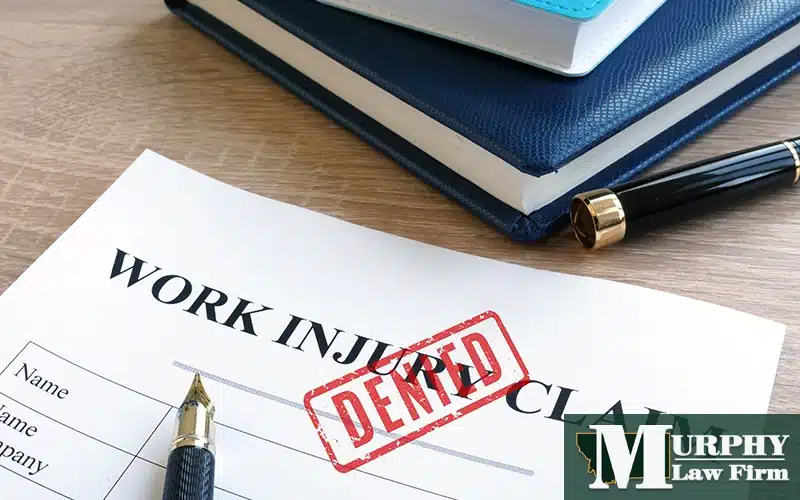
Essential strategies for Montana workers facing workers’ comp denials due to idiopathic injuries in Great Falls
Workers in Montana facing the challenge of a workers’ compensation denial due to an idiopathic injury or fall often find themselves navigating a complex and daunting process.
An idiopathic injury refers to an injury that occurs without any apparent external cause, occurring spontaneously or from an inherent medical condition, leading insurers to deny claims based on the argument that the injury is not work-related.
This article aims to demystify the intricacies of Montana’s workers’ compensation system and offer practical advice and strategies for workers who have unfairly had their claims denied.
By understanding your rights and the specific steps needed to contest a denial effectively, you can better prepare to fight for the compensation you rightfully deserve for your workplace injury.
What is considered an idiopathic condition?
Idiopathic conditions are health conditions that are inherently personal and not induced by work-related activities, making them distinct from injuries or illnesses that occur as a direct result of one’s employment.
In the context of workers’ compensation, idiopathic falls or injuries are those that cannot be attributed to the work environment or duties but rather stem from the individual’s own health issues or conditions.
Below are some examples of injuries that might be considered idiopathic in a workers’ comp claim:
- Seizure-induced falls. An employee has a medical history of epilepsy and suffers a seizure while at work, leading to a fall and injury. Since the seizure is not caused by the work environment but is instead a result of an existing medical condition, the resulting injuries could be considered idiopathic.
- Sudden cardiac events. An employee experiences a sudden heart attack or cardiac arrest while at work, not induced by any work-related stress or activity but due to underlying heart conditions. The injuries or consequences stemming from this event would be considered idiopathic.
- Spontaneous knee or joint dislocation. An employee with a history of joint dislocations experiences a knee or shoulder dislocation while walking on a flat surface at work, without any slip, trip, or external force applied. This could be considered an idiopathic fall as it is related to the individual’s pre-existing joint condition.
- Fainting spells or syncope. If an employee faints while standing at work due to an unrelated medical condition like dehydration, low blood sugar, or vasovagal syncope, the fall and any resultant injury might be deemed idiopathic because the cause is internal and not related to the work environment.
- Vertigo or balance disorders. An employee with a known balance disorder, such as vertigo, experiences a fall while performing routine tasks at work. Since the fall is caused by an internal condition rather than workplace factors, any resulting injuries would be considered idiopathic.
It’s important to note that while these examples may be considered idiopathic, the classification of an injury as idiopathic can vary based on individual circumstances and the laws governing workers’ compensation in the specific jurisdiction.
How to appeal a workers’ comp claim denial in Montana
Learn about your rights and how to file an appeal so you can get the compensation you deserve.
What is an idiopathic fall?
An idiopathic fall at work refers to a fall that occurs without an external cause and is instead related to the individual’s personal medical conditions or factors not connected to the work environment.
Essentially, it’s a fall that happens for reasons unrelated to the job or workplace hazards. This could involve situations where an employee collapses or loses balance due to a medical episode, such as a seizure, fainting due to low blood pressure, or the sudden onset of a medical condition like vertigo.
Because these incidents stem from the individual’s health issues rather than workplace conditions or activities, they are termed “idiopathic,” indicating that they originate internally and spontaneously, unrelated to the occupational tasks or surroundings.
What must the injured employee prove for an injury to be compensable under workers’ compensation?
If your workers’ comp claim was denied because of an idiopathic injury, it’s crucial to understand how this determination was made and what’s required for an injury to be compensable under Montana workers’ comp law.
To prove that an injury, illness, or disease is work-related in Montana, the injured employee must take certain steps and demonstrate several key elements:
- Employment relationship. The individual must prove they were a qualifying employee under Montana workers’ compensation law at the time of the injury, as opposed to an independent contractor or volunteer.
- Arising out of employment. The employee must show that the injury, illness, or disease occurred as a direct result of their employment or while performing work-related duties, meaning there is a clear connection between work and the injury.
- In the course of employment. The injury or illness must have occurred in the course of employment, meaning it happened during work hours and within the work environment or while engaging in an activity related to the job.
- Reporting and documentation. The injured employee is required to report the injury to their employer within a certain timeframe (typically within 30 days in Montana) and seek appropriate medical attention. Proper documentation from health care providers must support the claim.
- Exclusion of non-compensable conditions. The employee must establish that the injury is not due to their intoxication, self-infliction, or other excluded circumstances under Montana’s workers’ compensation laws.
By proving these elements, an injured employee in Montana can establish their entitlement to workers’ compensation benefits, which may include medical expenses, wage loss compensation, and vocational rehabilitation services.
Common tricks used by Montana workers’ comp insurance adjusters
Watch out for these common workers’ comp insurance adjuster tricks used to reduce or deny your claim.
How can a Montana workers’ comp attorney help if my claim is denied because the injury is considered idiopathic?
When a workers’ compensation claim is denied on the grounds that the injury is considered idiopathic, it’s vital to understand that the case isn’t necessarily closed. A workers’ comp attorney can be crucial in challenging the denial and helping you secure the compensation you deserve.
Firstly, the attorney can assist you by reviewing and analyzing the medical records and evidence to counter the assertion that the injury is not work-related. They can help you obtain expert medical opinions to demonstrate that the work environment contributed to or aggravated your injury, even if the initial cause seems unrelated to work activities.
Moreover, an experienced workers’ comp attorney can guide you through the appeals process, ensuring that all deadlines are met and that the case is presented effectively. They can also gather and present evidence to demonstrate the link between the workplace and your injury, challenging the idiopathic classification.
Please note that even pre-existing injuries or conditions that are exacerbated or worsened by the work environment may be eligible for compensation.
A skilled attorney can help clarify the distinction between purely personal medical issues and those incidents where work has significantly contributed to the injury’s severity or occurrence, ensuring your rights are fully protected and appropriate compensation is pursued.
Was your Montana workers’ comp claim denied due to an idiopathic injury or fall? We can help!
If your Montana workers’ compensation claim has been denied due to an idiopathic injury or fall, don’t lose hope. At Murphy Law Firm, our Great Falls workers’ compensation attorneys bring over 75 years of combined experience to the table, dedicated to helping injured workers like you fight for the compensation they rightfully deserve.
We understand that the complexities of workers’ compensation law can feel overwhelming when dealing with a denied claim. Reach out to us for the support and expertise you need to navigate your claim successfully.





